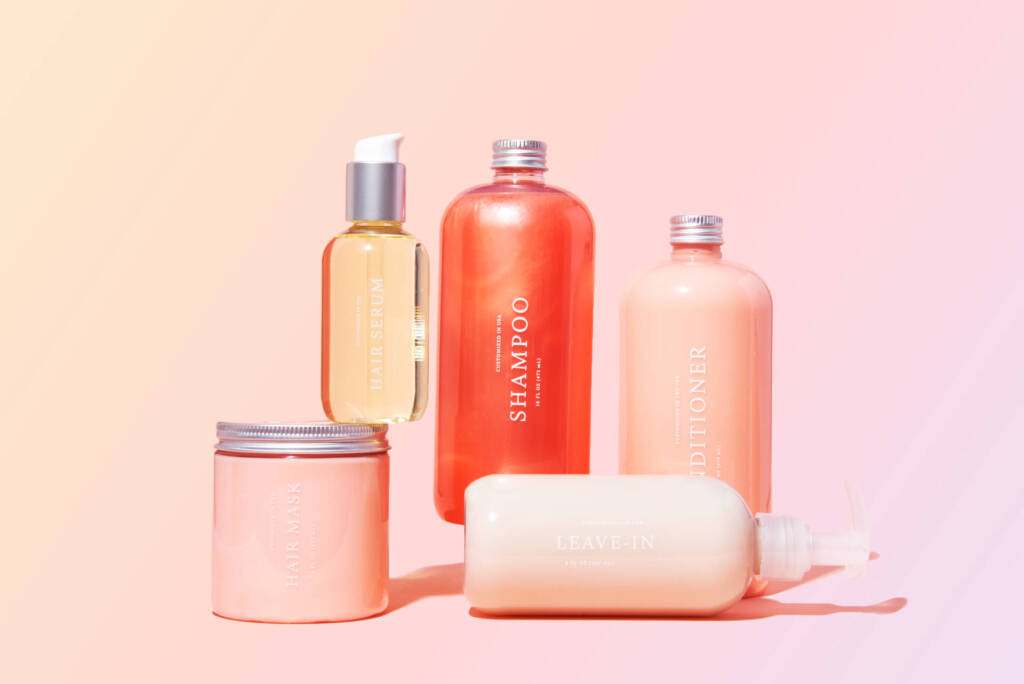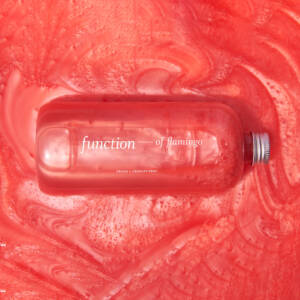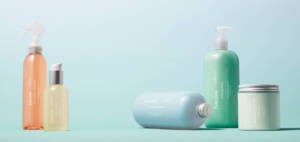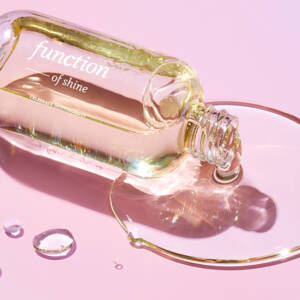Disclaimer: The information provided is not intended as medical advice. For any medical concerns, always contact your doctor.
If you’ve ever felt like your hands don’t feel completely clean after washing with soap, or if you’ve noticed cloudy stains on your bathroom door, chances are you’re living in an area with hard water.
The term “hard water” sounds like an oxymoron — how can a liquid feel solid to the touch? But before you take it too literally, hard water actually refers to water that has a high concentration of minerals, such as calcium and magnesium.
While hard water isn’t a cause for concern regarding your overall wellness, it can be detrimental to your hair health. Learn about the harmful effects of hard water on hair and what you can do to nip the resulting damage in the bud.
What Is Hard Water vs. Soft Water?
Hard water contains large amounts of dissolved minerals. Calcium and magnesium are the two most common minerals, followed by aluminum, barium, strontium, iron, zinc, and manganese.
When hard water flows from your bathroom faucet or into your kitchen sink, it leaves behind a mineral buildup on everything it comes into contact with — think limescale lining your pipes, taps, kettles, and even your beloved coffee machine! Your toothbrush, dishes, and most notably, your mane, aren’t spared either.
On the flip side, soft water is characterized by high levels of sodium. It’s usually the best type of water for hair care as it lacks hair-damaging minerals. FYI, hard water can be softened, which we’ll talk more about later.
So, what counts as hard water and soft water? The United States Geological Survey (USGS) uses calcium carbonate concentration in water to determine its hardness:
- Soft: 0 to 60 mg/L (milligrams per liter)
- Moderately hard: 61 to 120 mg/L
- Hard: 121 to 180 mg/L
- Very hard: More than 180 mg/L
If you’re interested in finding out whether you have hard water, the USGS has a handy map that shows water hardness in America. Or you can use an at-home hard water test kit to solve the mystery of your tap water.
Hard Water on Hair: This Is What It Does to Your Tresses
Hard water‘s high mineral content means your hair inadvertently absorbs more mineral deposits than it should. This spells trouble for your tresses in numerous ways.
1. Mineral Buildup
The most immediate impact of hard water on hair is the mineral buildup on your fibers. Picture a thin, icky film that sits atop your hair cuticles and follicles, preventing moisture and other hair-nourishing substances from entering the shafts and scalp. As you can imagine, dryness becomes a top concern. What’s more, the buildup weighs your mane down, resulting in flat hair.
On top of that, USGS also mentions that “When using hard water, more soap or detergent is needed to get things clean.” That’s why you may find that your shampoo can’t lather as well as it used to. Consequently, you struggle with a vicious cycle of poor cleansing and more buildup on your head.
2. Frizz and Breakage
Because of the mineral deposits, hard water on hair incites damage in various forms — namely, dullness, frizz, and hair breakage. And we’re not making this up. Chances are you’ve experienced it firsthand every time you doused your mane in hard water. Also, science shows it’s not all in your head.
Because hard water minerals are naturally alkaline, they hike up your hair’s pH level. Scientists explain that an “alkaline pH may increase the negative electrical charge” on the hair cuticles. This, in turn, steps up the friction between your strands (translation: frizz), leading to the not-so-pretty image of cuticle damage (think increased hair porosity) and breakage.
More clinical proof of hard water damage on hair is peppered throughout scientific literature.
A 2015 study in the International Journal of Dermatology examined the effects of hair washed with hard water versus soft water (distilled water). Compared to the soft water treatment, hard water on hair led to “a ruffled appearance” with “decreased thickness.” Another 2018 study also highlighted that hard water on hair dilutes the strength of hair strands, so they are more prone to breaking off.
3. Color-Fading
Turns out that hard water affects your dye job, too. Research shows that color-treated fibers easily absorb the metals present in hard water, leading to reduced shine and roughened hair texture.
Certain minerals, like copper, also participate in “metal-induced radical chemistry.” In human-speak, that means these specific minerals create hair-damaging radicals during your next hair-coloring session, which can interfere with how well your new hue turns out.
On top of that, hard water causes more porous hair, making it easier for dye pigments to leak out of your hair shafts. Consequently, you may find your hair color wearing off faster than before, requiring the need for more frequent touch-ups.
4. Scalp Issues
If you have an existing scalp condition, say, atopic dermatitis (scalp eczema), you may feel the brunt of hard water on your scalp, too.
A 2021 systematic review and meta-analysis involving 385,901 participants found that hard water impairs the skin barrier. This intensifies the risk of atopic eczema in the scalp area and other parts of the body.
Another 2018 study discovered that sulfates (found in most shampoos) and hard water interact to increase moisture loss from the skin barrier and possibly activate atopic dermatitis. The same study also suggested that a water softener may help prevent this scalp issue from cropping up.
You Need Not Suffer the Effects of Hard Water on Hair
Perhaps you’re now struggling with symptoms of hard water hair damage, such as dry hair and split ends. Or maybe you want to avoid the whole catastrophe altogether. Whichever way you lean, learn what you can do to treat and prevent the ill effects of hard water on hair.
Boost Your Water Quality
It’s highly impossible to change your water source unless you move to a state well-known for its soft waters or switch to bathing with bottled water. What you can do instead is boost your water quality with a quick and easy fix, like a shower filter.
A shower filter essentially functions the same way as a water filter does. It sieves out the minerals in your water to “soften” it. Shower filters usually come in the form of showerhead filters (to replace your existing showerhead) or in-line filters (that work well with what’s already in your bathroom).
Use a Clarifying Shampoo
Remember the gross mineral buildup we mentioned earlier? Get rid of it by using a clarifying shampoo at least once a week.
A good option would be Function of Beauty’s custom shampoo. To promote the appearance of healthy hair, add the “soothe scalp” and “nourish roots” hair goals when building your haircare formula. These goals help clear out scalp buildup and soothe your scalp to keep your mane clean and moisturized.
If you’ve gone for a dye job and worry about the impact of hard water on hair, you may want to consider our custom purple shampoo. It’s specially formulated for those with blonde, gray, highlighted, bleached, or balayage hair colors. With our purple shampoo, you can now say no to brassiness and color-fading and yes to shine!
P.S. Our other hair goals are perfect for tackling additional signs of hard water on hair — think frizz, dryness, dullness, and the like. Check out the full list.
Avoid Sulfates in Haircare and Styling Products
Sulfates can be harsh on your mane, especially if it’s already maltreated by hard water. After all, these cleansing agents are known to:
- Dry out scalp and strands
- Worsen frizziness and color-fading
- Wash away natural hair proteins
That’s why we recommend steering clear of sulfates in all the products that go on your head.
If you’re looking for sulfate-free formulations for hair care and styling, look no further than Function of Beauty. Our haircare range is a mix of synthetic and naturally derived ingredients that excludes sulfates, parabens, phthalates, and other unwanted ingredients.
Apply Conditioning Treatments
If you recall, the alkaline nature of hard water intensifies the negative charge on your fibers, so they become more porous and frizz easily. But conditioning treatments, such as a rinse-off conditioner or hair mask, can help smooth down the ruffles on your cuticles.
For extra gloss, smoothness, and manageability, follow up with Function of Beauty’s custom leave-in. This ultra-lightweight conditioning cream infuses your locks with an extra dose of moisture so that your hair feels silky-soft without being weighed down.
Don’t Let Hard Water Be Hard on Your Mane
From mineral buildup to frizz, breakage, and color fading, hard water does a number on tresses. But the thing is, you can take steps to reverse the damage and even prevent it in the first place.
Your best bet is a shower filter to transform hard water into soft water. If you aren’t up for that, simple tweaks to your haircare routine can help neutralize the fallout from hard water on hair. Use a clarifying shampoo on your wash days, skip the sulfates, and amp up the conditioning.
Need some help in sourcing products? Find your unique formulation with our hair quiz that will make the damaging effects of hard water a thing of the past.





